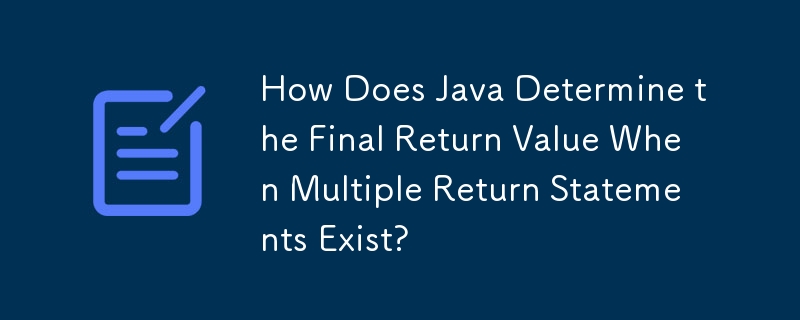 Java
Java
 javaTutorial
javaTutorial
 How Does Java Determine the Final Return Value When Multiple Return Statements Exist?
How Does Java Determine the Final Return Value When Multiple Return Statements Exist?
How Does Java Determine the Final Return Value When Multiple Return Statements Exist?
Nov 28, 2024 pm 01:55 PM
Multiple Return Statements: Determining the Final Return Value
The Java language provides the ability to return multiple values from a method using multiple return statements. However, the question arises as to which one of these statements ultimately sets the final return value.
Language Specification and Return Value
According to the Java Language Specification, if there are multiple return statements within a method, the return value is determined by the last statement that returns a value. Therefore, in the following code snippet:
String test() {
try {
return "1";
} finally {
return "2";
}
}the final return value of the test() method will be "2", regardless of the JVM implementation. This is because the finally block is always executed, even if there is an exception.
Compiler Warnings and Error Handling
Many modern compilers will issue warnings or errors for code like the example above, as it can be confusing and potentially lead to bugs. For instance, Eclipse may suggest that the return block will never be executed, which is incorrect in this case.
Best Practices
Although multiple return statements are allowed in Java, it is considered poor practice to use them. This is because it can make code harder to read and understand, and can potentially result in unexpected behavior.
Therefore, it is generally recommended to avoid using multiple return statements and instead utilize a single return statement that encapsulates the desired functionality.
The above is the detailed content of How Does Java Determine the Final Return Value When Multiple Return Statements Exist?. For more information, please follow other related articles on the PHP Chinese website!

Hot Article

Hot tools Tags

Hot Article

Hot Article Tags

Notepad++7.3.1
Easy-to-use and free code editor

SublimeText3 Chinese version
Chinese version, very easy to use

Zend Studio 13.0.1
Powerful PHP integrated development environment

Dreamweaver CS6
Visual web development tools

SublimeText3 Mac version
God-level code editing software (SublimeText3)

Hot Topics
 How does Java's classloading mechanism work, including different classloaders and their delegation models?
Mar 17, 2025 pm 05:35 PM
How does Java's classloading mechanism work, including different classloaders and their delegation models?
Mar 17, 2025 pm 05:35 PM
How does Java's classloading mechanism work, including different classloaders and their delegation models?
 Top 4 JavaScript Frameworks in 2025: React, Angular, Vue, Svelte
Mar 07, 2025 pm 06:09 PM
Top 4 JavaScript Frameworks in 2025: React, Angular, Vue, Svelte
Mar 07, 2025 pm 06:09 PM
Top 4 JavaScript Frameworks in 2025: React, Angular, Vue, Svelte
 How do I use Maven or Gradle for advanced Java project management, build automation, and dependency resolution?
Mar 17, 2025 pm 05:46 PM
How do I use Maven or Gradle for advanced Java project management, build automation, and dependency resolution?
Mar 17, 2025 pm 05:46 PM
How do I use Maven or Gradle for advanced Java project management, build automation, and dependency resolution?
 How can I implement functional programming techniques in Java?
Mar 11, 2025 pm 05:51 PM
How can I implement functional programming techniques in Java?
Mar 11, 2025 pm 05:51 PM
How can I implement functional programming techniques in Java?
 Node.js 20: Key Performance Boosts and New Features
Mar 07, 2025 pm 06:12 PM
Node.js 20: Key Performance Boosts and New Features
Mar 07, 2025 pm 06:12 PM
Node.js 20: Key Performance Boosts and New Features
 Iceberg: The Future of Data Lake Tables
Mar 07, 2025 pm 06:31 PM
Iceberg: The Future of Data Lake Tables
Mar 07, 2025 pm 06:31 PM
Iceberg: The Future of Data Lake Tables
 How can I use JPA (Java Persistence API) for object-relational mapping with advanced features like caching and lazy loading?
Mar 17, 2025 pm 05:43 PM
How can I use JPA (Java Persistence API) for object-relational mapping with advanced features like caching and lazy loading?
Mar 17, 2025 pm 05:43 PM
How can I use JPA (Java Persistence API) for object-relational mapping with advanced features like caching and lazy loading?
 How do I implement multi-level caching in Java applications using libraries like Caffeine or Guava Cache?
Mar 17, 2025 pm 05:44 PM
How do I implement multi-level caching in Java applications using libraries like Caffeine or Guava Cache?
Mar 17, 2025 pm 05:44 PM
How do I implement multi-level caching in Java applications using libraries like Caffeine or Guava Cache?






